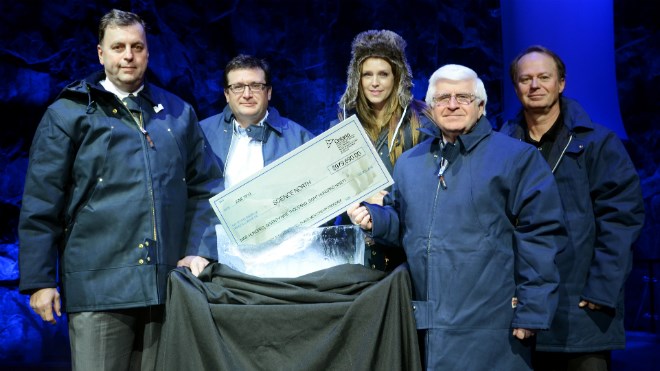Historically, about half of the Arctic was covered by ice all year round.
But climate change has reduced the region's summertime ice cover by about 20 per cent.
Local filmmaker David Lickley's latest IMAX film, tentatively entitled "Polar Quest", focuses on the impact the reduced ice cover has on the people and animals who live in this environment.
"Polar Quest", scheduled to be released at Science North in February 2014, is the sixth IMAX film Lickley has produced in conjunction with Science North, and the first to be shot in 3D.
He has been working on the film for five years. "Polar Quest" is scheduled to be released by theatres worldwide over a 10-year period.
One of the animals the film focuses on is the bowhead whale, which relies on the ice as protection from predators such as killer whales.
“Killer whales have a large dorsal fin,” Lickley said. “They don't go under the ice. The bowhead can go under and smash through 10 feet of ice with its back. It likes the ice for protection.”
Ice is also crucial to polar bears, who use it as a platform to hunt seals.
“What's happening for polar bears is that hunting season is shrinking,” Lickley said.
“Whereas they used to have ice to go out on eight months of the year, now six months is their window of hunting. So they have less of a window to hunt to put on fat to get through to the next year.”
The filmmaker shared details of his latest project at a June 19 press conference, where Sudbury MPP Rick Bartolucci announced the Northern Ontario Heritage Fund Corporation (NOHFC) is investing $979,890 in the film.
The cheque, appropriately, was frozen into a block of ice.
“Science North continues to produce fascinating large format films that attract visitors and tourists to Greater Sudbury and help boost our local economy,” Bartolucci said, in a press release.
“By investing in exciting projects such as this one, the Ontario government continues to help diversify the northern economy, promote northern tourism and build careers close to home for our young people.”
While "Polar Quest" has already received funding from private sector partners such as FedNav and Xstrata Nickel, Lickley said the provincial funding is very much appreciated.
“We needed that piece of the puzzle – the provincial government money – to be able to finish this film,” he said. “So it's crucial.”
Science North CEO Guy Labine said the science centre would never be able to produce IMAX films if it weren't for the ongoing support of the NOHFC.
“This film is a Northern Ontario-made product,” he said. “I'm very proud to celebrate that. We're especially proud to know we are one of the world's largest educational IMAX film producers.
“We're fortunate we have David Lickley, who lives in our community and has been making films both here at Science North and in the community. We're proud he is recognized among his peers as being one of the best in the IMAX industry.”
Through the development of "Polar Quest", Science North and Music and Film in Motion have been collaborating to mentor aspiring filmmakers on various aspects of producing IMAX films. Part of the NOHFC funding is being used for this purpose.
“We're including more people in the film business in Northern Ontario who've got experience, but haven't had a change to work in big, large-format IMAX films,” Lickley said.
Three people have accompanied him on film shoots in the Arctic, and now that he's finished filming, another six will help out with post-production work.
Music and Film in Motion associate director Tammy Frick said those who have taken part in the mentorship program so far have been very pleased with their experience.
“So on their behalf, I'd like to say thank you,” she said.
Chris Elliott, a local filmmaker and owner of Insight Media Works, accompanied Lickley on a film shoot on the northern coast of Baffin Island in March and another in Raglan in Northern Quebec in May.
There, he assisted director of photography Mark Poirier.
“It really is an amazing opportunity to work with some of these film professionals who are at the top of their field,” he said.
“You rarely get a chance to get this sort of access to this level of filmmaking ... It was one of the most exciting experiences of my career. The landscape was incredible.
"You'd be up filming, and once in a while you'd look down from the camera, and just almost be in disbelief about the landscape you're in.”
